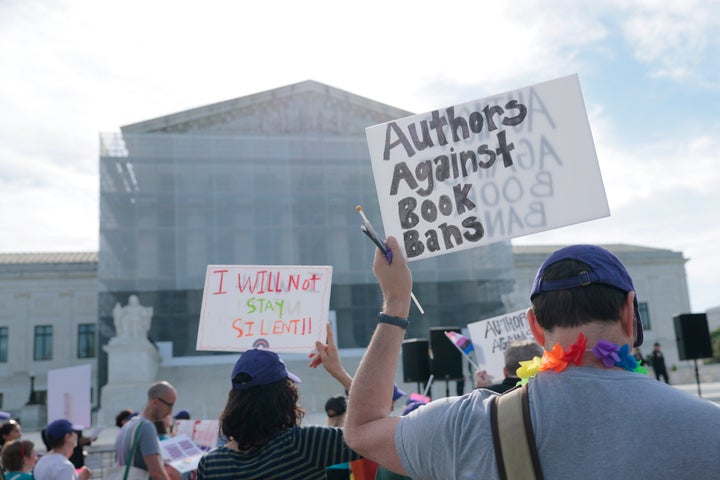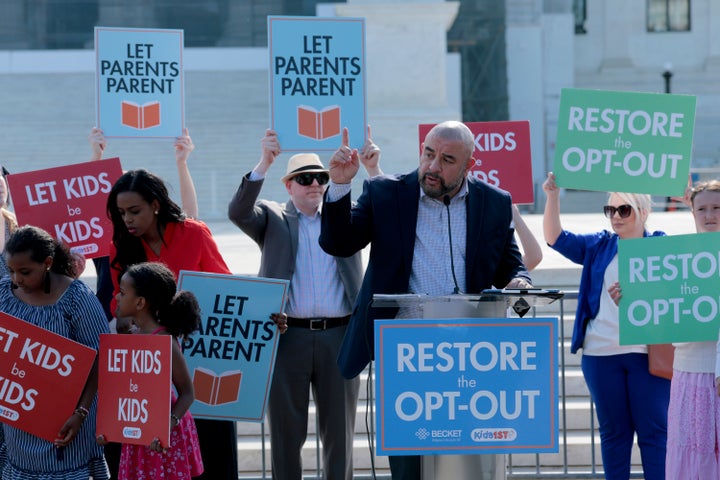Supreme Court Signals Support For Religious Parents Against LGBTQ+ Books
WASHINGTON — In the midday sun in front of the U.S. Supreme Court on Tuesday, demonstrators and activists held pro-LGBTQ+ signs, waved rainbow flags and cheered on a set of diverse speakers. Just a few hundred feet away, a similar-sized crowd huddled in the shade, holding “Let Parents Parent” signs and listening to speakers to find out what was going on inside.
Both groups were there because the court was hearing oral arguments in Mahmoud v. Taylor. The case out of nearby Montgomery County, Maryland, is asking the nine justices to decide if requiring books with LGBTQ+ themes as part of the elementary school curriculum is a violation of religious freedom.
Advertisement
The justices signaled support for the argument presented by the plaintiffs’ lawyers. In the last several years, the conservative-leaning court has ruled in favor of those making “religious freedom” claims, even at the expense of the rights of LGBTQ+ people.
“We think the court heard those arguments. They seemed sympathetic to the concerns of the parents, and we look forward to the court’s ruling by the end of June,” Eric Baxter, senior counsel at the Becket Fund, which is representing the parents, told the crowd.
In 2023, a group of religious parents sued Montgomery County public schools after the district added LGBTQ+ books to its language arts classes for elementary-age students. Schools initially allowed parents to let their children miss class when those books were being taught. But several months later, the system said managing all the absences had become too burdensome — and educators were worried that an increasing number of students missing school would stigmatize children who belong to the communities being discussed in the book.
Advertisement
A federal judge and an appeals court ruled against the parents who said they objected to the books on the grounds of religious freedom, and they took their case to the Supreme Court.
Pro-LGBTQ+ activists think that the books at the center of the Supreme Court case, which include stories about gay couples and trans children, have a place in the school system.
“That’s what our education system is all about,” Phillip Alexander Downie, the CEO of Montgomery County Pride Family, the host of the rally, told HuffPost. “It’s about building understanding, it’s educating folks on the histories and backgrounds and plights of other people to ensure that we can create a more inclusive and just society for everyone.”
Advertisement

Anna Moneymaker via Getty Images
The case comes at a time when attacks on the LGBTQ+ community are at an all-time high, and some protesters see this as an issue that extends far beyond a curriculum.
“I wouldn’t want my children to go to school and not learn how to be inclusive of other people,” Brooke Farquhar, a 69-year-old from Howard County, Maryland, a Washington, D.C., exburb, told HuffPost.
Advertisement
Others were there to stand up for trans rights as they increasingly come under attack by President Donald Trump.
“I’m protesting against erasure,” Julian, a 26-year-old from Montgomery County who asked to only be identified by their first name, told HuffPost. “What the Trump administration has been trying to do ever since they got into office is erase trans people.”
“I grew up being taught that being trans is wrong and that God would judge me and that I was a sinner,” Julian continued. “When I was a little trans kid, it would’ve helped a lot to know that I’m not alone.”
Advertisement
Other attendees worried about what could happen if the Supreme Court rules in favor of the parents.
“If we start opting out of this, what else are we going to do? Opting out of biology because they believe in creationism?” Ellen McDonald, a 70-year-old from Montgomery County, told HuffPost. “How is this so different from Berlin in the early 1930s? Did we not learn from this?” she added, referencing Nazi-sponsored book-burning campaigns.

Anna Moneymaker via Getty Images
But the other side didn’t think the opt-outs were such a big deal — or were tantamount to book-burning.
Advertisement
“It’s not about banning a book. It’s about a parent being able to decide what they want for their own child,” John Dubbler, a 67-year-old from St. Mary’s County in the southern part of the state, told HuffPost.
He said letting kids skip certain lessons shouldn’t put too much of a burden on teachers.
“They do a lot of things harder than that,” he said with a chuckle. “If that’s too much work, then they’ve got some problems.”
As the lawyers for the plaintiffs huddled on the steps of the court above the crowd, the mood on their side of the rally shifted.
Advertisement
“They want to force this curriculum down our throat. Are we going to let them do that?” Wael Elkoshairi, a parent and a leader of the Family Rights for Religious Freedom group, asked the crowd. They shouted back, “No!”
“These are our children, these are our religious principles,” he said.
“Maybe the court in Greenbelt [Maryland] didn’t agree with our position, and maybe the circuit court didn’t agree with our position,” Elkoshairi said about the two previous rulings. “But I submit to you today, we will prevail in the highest court.”

Comments are closed.